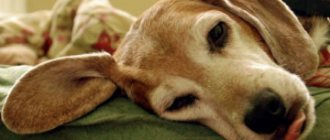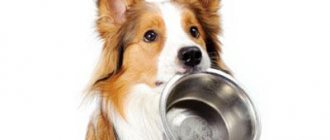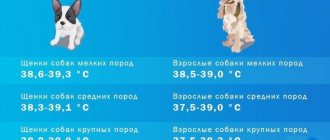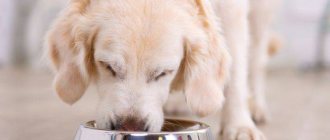Proper feeding of a nursing bitch that has given birth is the key not only to her health, but also to the well-being of the entire litter. That is why every owner, especially if he has witnessed the birth of puppies for the first time, should know what to feed the dog after birth.
The diet of a lactating bitch determines the quality of her milk, but even if, after giving birth, the dog for some reason refused to feed the puppies, it is important to restore the body that was damaged after pregnancy. It is important to understand that the period of gestation of puppies is not only a natural process, but also a lot of stress for any dog. Therefore, today we will discuss how to create a diet suitable for a bitch who has given birth during the postpartum period, during lactation.
What to feed your dog after giving birth?
How to feed a bitch immediately after the end of the birth process?
Often, dogs that feel the moment of labor approaching refuse food in advance, so as not to create unnecessary heaviness in the intestines and not be distracted from the process. When a dog has already given birth, she is busy taking care of the puppies, and the owner has a logical question: “Does the animal need to be fed now and what should I offer it?”
Instinct forces the new mother to eat the placenta of each puppy, in the usual language - the placenta. In addition to the fact that this is how wild dogs previously “covered their tracks” of childbirth, preventing predators from smelling attractive odors, this way they also refreshed themselves after the grueling and painful process of childbirth. Under no circumstances should a bitch be prohibited from eating the placenta, although there is no danger of attack by predatory animals.
Dogs usually free the puppies from the placenta themselves.
The fact is that the afterbirth contains vitamins, microelements and a large amount of protein that the dog needs to maintain strength and produce milk, rich in substances necessary for puppies. The placenta contains hormones that provoke the production of colostrum, that is, eating it is a kind of signal: “The puppy has been born, you need to feed it!”
Dog's afterbirth
The only thing is that with a large litter (more than ten puppies), eating all the placenta can cause an upset stomach in the bitch. In this situation, you need to offer the animal clean water and also give an adsorbent (for example, activated carbon, one or two tablets for every ten kilograms of weight). However, there is no need to force the dog to drink, or to persuade the dog to eat - it would be correct to offer the first food four to five hours after the birth of the last puppy, when the bitch has calmed down, licked and fed all the children. Below we will tell you exactly what food you can give your dog after giving birth.
Clean, cool water should always be available to the dog.
How to feed at 2–3 weeks
Knowing what to feed a nursing dog can help encourage it to recover quickly after giving birth. It is better to divide food intake into 4-5 stages. It is believed that if your dog has had about 4 puppies, by this point the volume of the daily diet will be doubled, and if there are 8 babies, it will be tripled.
At this time, vegetable purees from zucchini, pumpkin, beets, carrots or cauliflower will be beneficial for the female’s health. You can also prepare soups, broths for mommy, and also give her lean meat (the main thing is that it does not contain bones).
We recommend this article:
Symptoms, treatment and prevention of mastitis in dogs: recommendations from veterinarians
General data on the nutrition of a dog that has given birth
Typically, the lactation period in dogs lasts about five to six weeks, and the functioning of the mammary glands increases already a couple of weeks before birth. Veterinarians have been studying the bodies of lactating dogs of different breeds for many years to determine whether such a diet is suitable for bitches at different stages of feeding their offspring.
Dogs cannot produce or store most nutrients, vitamins and minerals in their bodies unless the animal receives them through food. Accordingly, these necessary substances will not be in the milk; more precisely, the puppies will first “suck” them out of the mother’s body. If the diet is poor or improper, the bitch will suffer first; after a short time, the negative consequences will affect the entire litter. To prevent this from happening, the owner must understand the basic principles of feeding the dog during the puppy feeding period.
Properly fed bitches grow strong and healthy puppies.
Feeding in the following days
Animal fats can begin to be introduced into the bitch’s diet on the 8-10th day; it is better if these are by-products. Add heart and liver, cut into small pieces, to porridges and soups along with a small amount of fresh vegetables. From now on, soups for her can also be cooked in meat broths. Diversify your dog's diet by alternating dairy and meat feedings, adding raw vegetables and fruits, cut into pieces or grated, if he eats them along with porridge.
After giving birth, the bitch's food must be supplemented with ground eggshells, special vitamin complexes, rehydron and other mineral supplements.
Please note that lactation lasts only 6 weeks; by the end of the 5th week, the amount of milk decreases noticeably. Therefore, until this time, the amount of food that you give the dog should constantly increase - after all, the amount of milk sucked also becomes greater. Then, after you start feeding the puppies, gradually reduce the portions of food for the bitch. After the puppies have been weaned, feed her 3 times a day, and after some time, switch to the usual once or twice a day feeding regimen.
Has your dog given birth? Congratulations! Now you have to take care of the tiny puppies, but also not forget about their mother.
Once dogs are done giving birth, they need the right variety of food to make the milk more nutritious to feed their offspring. Your pet's food should contain a sufficient amount of calories, vitamins, and minerals.
After giving birth, a mother dog sometimes refuses to eat or her appetite decreases. This happens because the dog eats the placenta (the placenta with the membrane of the fetus).
But for three weeks she needs to be fed 2 times more than usual. Owners most often do not know how and what a dog should eat after giving birth.
It is very necessary and important to offer your dog healthy food in the first hours. At this moment, she needs more liquid food than usual. You can offer her:
- various grain porridges;
- cottage cheese or other fermented milk products;
- omelette.
It is necessary to feed in small portions. She should eat 6-7 times a day.
Drinking plenty of fluids plays a very important role. After all, the dog needs to produce milk for the puppies, and in the process, fluid in the body is lost. It is necessary to give water or milk every 3 hours. Cream is also useful.
Natural nutrition for a nursing dog
It is important to understand that you cannot change an animal’s type of nutrition unexpectedly, especially if we are talking about a dog that has given birth, whose body has already suffered stress. Therefore, if the bitch ate natural products before giving birth, you need to keep this option, making some additions.
It is on a natural diet that it is important to focus on what time period has already passed after childbirth. The basis of the diet will continue to be fresh meat or lean sea fish, poultry, offal, vegetables, lactic acid products, and herbs.
Depending on the week of lactation, nutrition will be adjusted
Table 1. Feeding the dog in different weeks after birth
| How much time has passed? | What to feed? |
| The first week after the birth of puppies | For the first two to three days, the bitch may have no appetite, but every five to seven hours you need to offer the dog food and make sure that she eats at least a little. At this stage, you can give your dog pureed meat and vegetables, kefir, cottage cheese, and lean fish. When the appetite is restored and returns to normal, the bitch is fed in small portions five to six times a day. The dog’s diet certainly includes meat (veal, rabbit, turkey, chicken), offal (liver, lung, brains), fish (low-fat sea fish), and calcined cottage cheese. The first five to seven days after birth, you do not need to offer your dog fruits, herbs and vegetables, so as not to provoke allergies and stomach upset. |
| Second or third week after the birth of puppies | The main feeding remains the same (meat, poultry and offal, sea fish, dairy products). Grated vegetables, berries, fruits (carrots, cauliflower or broccoli, zucchini, apples and pears, pumpkin), chopped greens, and eggs are returned to the animal’s diet. The dog is fed four times a day; if the litter consists of three to four puppies, its pre-pregnancy daily food intake is doubled; if there are more than eight puppies, it is tripled. |
| Fourth to sixth weeks of feeding | At this stage, the puppies are introduced to complementary foods; accordingly, the number of feedings to the mother is reduced to three per day. The nutrition remains the same, only the portion sizes are reduced. When the bitch stops feeding the last puppy, she is given a fasting time. On the first day of weaning, the dog is given a limited amount of liquid and about a quarter of the usual daily food intake. On the second day, the dog receives a third of the usual portion, then half. This will drain her milk. On the fourth day, nutrition returns to pre-pregnancy norms. |
When the puppies begin to receive complementary foods, the mother's portion is reduced
Vitamin supplements for the bitch after giving birth
During pregnancy and lactation, the bitch should receive not only natural products, but also some vitamin and mineral supplements. The fact is that regular food contains the amount of nutrients that an adult animal needs. When a dog is nursing a litter, it requires more resources.
Table 2. Additives to dog food after birth
| Name | brief information |
| "Tsamaks" | The composition includes phosphorus, sulfur, magnesium, potassium, calcium, copper and other substances important for the dog’s body. The drug improves the animal’s immunity and removes toxins. |
| "Tetravit" | Contains vitamins A, E, D3 and F. The drug has an antirachitic effect, promotes the metabolism of calcium and phosphorus in the body, increases the content of vitamins in the blood, regenerates epithelial tissue, and increases resistance to infections. |
| "Gelakan Baby" | A vitamin-protein-mineral cocktail that has a beneficial effect on the formation of the skeleton of puppies, and also protects the joints, ligaments and bones of a nursing dog from calcium leaching. Contains selenium, collagen and vitamins E. |
| "CalciDi" | Contains the necessary amount of calcium and phosphorus necessary for richness of milk. The drug must be administered from the second half of pregnancy so that the skeleton of the fetus is formed correctly and the bitch does not waste her own reserves of nutrients. |
Excel Daily Multivitamin | A complex of vitamins and polyminerals necessary for every animal. The composition includes minerals, calcium, phosphorus, water-soluble and fatty acids, B-group vitamins, linoleic acid. |
Important point! Before introducing the above-mentioned drugs into the diet of a nursing bitch, it is necessary to visit a veterinarian and discuss with him the need for a particular supplement.
A nursing bitch should get vitamins not only from food
Vitamin supplements for dogs after birth
The dog’s body needs vitamins and minerals especially after giving birth; there may not be enough of them in food during this period. In the middle of the first week, calcium, vitamin D, then A, E are included in the diet. For this, special complex mixtures are purchased.
The most popular:
- Tsamaks is a feed additive for small and large breeds that improves immunity and removes toxins. Contains phosphorus, sulfur, potassium, magnesium, calcium.
- Tetravit is an oil solution containing vitamins A, E, D3, F. Prescribed from the second half of pregnancy, during lactation. Helps prevent rickets in puppies, increases resistance to infectious diseases.
- Gelakan Baby is a vitamin-protein-mineral powder that promotes the formation of the baby’s skeleton, protects the mother’s joints and ligaments from calcium leaching.
- Farmavit Neo - prevents hypovitaminosis and metabolic disorders during pregnancy and after childbirth. Contains essential vitamins, micro- and macroelements.
- CalciDi – contains calcium, phosphorus, vitamin D. Recommended in the second half of pregnancy. Ensures the correct formation of the skeleton of future offspring.
- Excel Daily - contains minerals, multivitamins, linolenic acid, recommended for pregnant, lactating dogs and puppies.
Dry food for a postpartum dog
If a dog has been eating dry industrial food all its life, it makes no sense to switch it to a natural diet before or after giving birth. Today, pet stores offer holistic and super-premium foods that perfectly cover all the needs of a bitch after giving birth.
In the second half of pregnancy, the bitch should be gradually switched to food from the “For pregnant and lactating” line; if the desired brand does not produce this type of food, the dog is given dry food for the youngest puppies (usually the line is called “Starter”). Such feeds have an optimal protein content (24-27%) and an increased content of vitamins, minerals and micro-macroelements.
Starter food for mother and large breed puppies
Important point! In order for a dog to digest and assimilate any of the dry industrial food offered to it, a large amount of moisture is required, so it is better to give the giving birth to food that has been previously soaked in cool boiled water. This feeding method is used in the first two to three weeks after birth (you can replace dry food with wet food from the same line).
Despite the fact that dry food covers the needs of both bitches and puppies, it is better to play it safe and add fermented milk products (cottage cheese, kefir), as well as supplements with vitamins and minerals, to the diet of a nursing dog. This must be done after first coordinating the actions with a veterinarian.
Grown-up puppies can receive the same food as their mother
Lines of dry food suitable for dogs after childbirth
Even if the animal was fed budget food before pregnancy, as soon as the owner learns about the replenishment, he should smoothly transfer the dog to a higher quality brand. The Russian pet market offers dozens of dry food of the “super-premium” and “holistic” classes. Here are some options that are good for pregnant and postpartum dogs:
- “Royal Canin Starter” for mother and puppies (variations “Mini”, “Medium”, “Maxi” and “Giant” depending on the breed).
- Hill's Pappy for all breeds.
- “Pro Plan Performance” (variations “Small” or “Large” depending on the breed).
- "Grandorf Pappy" for all breeds.
- Monge Mini Starter.
- "Farmina" for pregnant and lactating bitches and puppies.
- "Akana Pappy and Junior" for all breeds.
Do not mix dry food and natural food.
How to stimulate milk production in a pregnant bitch
Often, owners do not know what to feed a newborn dog to produce milk. It is known that the quality of nutrition directly affects lactation, so simply increasing portion sizes is not enough - it is important to make food as balanced and nutritious as possible. In this case, it is necessary to take into account the physiological characteristics of the dog. Some pets require more food, while others, on the contrary, are often malnourished.
What to feed a cat after giving birth: proper nutrition and care
There are also medications that help four-legged mothers increase milk production. However, you should not risk your pet’s health and use them without first consulting a veterinarian.
Note! If lactation remains weak even after adjusting the diet, you can start feeding the bitch milk with honey dissolved in it.
Dog's first meal after giving birth
The process of bearing and giving birth to offspring exhausts females, so they need rest. The dog needs time to recover, so at first it is unlikely to show interest in food.
If your pet refuses to eat in the first hours after birth, this is normal. Don't worry and take her to the vet. The right decision would be to leave your pet alone, let her relax and limit her from all kinds of stressful situations. There should always be fresh water near the bed.
Only after 6–8 hours can you begin to think about what to feed your dog after giving birth. It is worth returning to your usual regimen gradually, starting with liquid food. You can offer your pet fermented milk products and cereals. Meat broths should not be given immediately, as they may be hard on the stomach. It is worth introducing such food in small portions and definitely not on the first day.
Lack of appetite in the first days after birth is normal
First week
After 1–3 days, the bitch’s appetite should normalize, but this does not mean that you can offer her her usual food. The body is still in the recovery stage, so high-calorie foods can have a negative impact on the female’s well-being. You should be especially careful with Chihuahuas and other dogs with a fragile constitution and an increased risk of complications.
You can still feed your pet with milk, kefir, and cottage cheese. It is important for the owner to gradually provide a sufficient amount of carbohydrates, which the dog’s body especially needs now. Liquid cereals will help with this, but it is important not to overdo it with the amount of them in the diet. On the fourth day, you can start feeding the dog broths and light soups.
Note! It is better to feed the bitch often (about 5 times a day), but in small portions. At first, it is advisable to bring food directly to the dog's bed, since he is still weak.
2nd and 3rd week of feeding
The pet's body gradually returns to normal functioning. You can already start feeding boiled meat, sometimes allowing your pet to enjoy raw meat. By-products will also be beneficial. However, it is worth remembering that all this food must be introduced gradually, in small portions.
By the third week, the owners’ question about what to feed a nursing dog practically disappears. At this time, most of the food is available to the pet, so the diet becomes as similar as possible to what she had before pregnancy.
The third week after childbirth is a period when natural food should be truly nutritious and varied. An almost completely restored body requires more energy for its work, while a significant part of the nutrients is also spent on feeding the offspring.
Improper nutrition is a threat to dogs and puppies
Against the background of poor, inadequate nutrition, a measly bitch can develop a disease leading to death - eclampsia. Also, improper nutrition is fraught with digestive disorders in a dog (diarrhea or constipation), lethargy, loss of milk, and abandonment of puppies. Also, an incorrectly selected diet can cause skin diseases in your dog, including baldness.
The bitch who gave birth already has a reduced immune system, and if the owner does not support the pet in such a difficult time, the dog can become seriously ill. The poor health of the bitch steadily affects the puppies, and in the worst case, both the mother dog and the entire litter may die.
Raising puppies takes a lot out of a dog's health.
If the owner is experiencing pregnancy and the postpartum period in a dog for the first time, he should consult with a veterinarian or an experienced breeder. Experts will tell you what to pay attention to.
Important point! A healthy nursing dog, which receives all the substances it needs from food, behaves calmly, there is no exhaustion or severe deterioration of the coat, the dog’s appetite and stool are normal.
The behavior of puppies is also an indicator of the health of the nursing mother and the quality of her milk. After a meal, babies should fall asleep peacefully, without squeaking or fussing. The owner must weigh each puppy daily: if the entire litter regularly gains weight and develops correctly, then we can say that the feeding diet is suitable for both the nursing bitch and her puppies.
Newborn puppies are weighed every day and the results are recorded for control.
The role of proper diet
In the first days of their life, little offspring are most dependent on their mother. Puppies feed exclusively on milk, which means your main task is to do everything to ensure that the female’s lactation period passes without unnecessary complications.
We recommend this article:
What dog owners should know about natural dog food
Success is primarily influenced by a dog’s balanced diet. The presence of vitamins in milk that are vital for babies will depend on how nutritious it is. Considering that your pet shares everything useful with her cubs, you need to be able to take care of her health.
If we take into account the normal indicators, this is the presence in milk of 7% protein, 4% lactose, and 8% fat. In addition, this liquid must contain various vitamins and minerals. The female receives all this thanks to a balanced diet.
If you don’t think through this point in a timely manner and don’t change anything in your dog’s daily menu, you risk getting unhealthy, weak offspring, and the pet itself will be pretty exhausted. That is why knowing what to feed a dog after giving birth is simply necessary for every owner of a future tailed woman in labor.
We recommend this article:
How to properly care for your pregnant dog
Nutrition for eclampsia in a dog that has given birth
Postpartum toxicosis in dogs, accompanied by eclampsia, is a deadly condition. Typically, small dogs are at risk: toy terriers, Yorkshire terriers, Spitz. The disease is associated with a severe lack of calcium in the body.
Symptoms of eclampsia:
- the dog suffers from tremors, convulsive manifestations;
- the animal’s coordination is impaired, its gaze is unfocused;
- the pulse quickens, breathing becomes intermittent;
- the dog cannot be in the light, tries to hide in a secluded place;
- the animal whines for no reason, is worried;
- lack of appetite, refusal of water;
- bitch ignores puppies.
Miniature dogs are prone to developing eclampsia
The owner of a dog that has developed eclampsia must act quickly: five drops of valocordin are poured into the animal’s mouth, then a 10 percent solution of calcium gluconate is forcibly given (2 milliliters per kilogram of weight). Calcium can also be administered intravenously or subcutaneously - for this it is better to contact a veterinary clinic.
If a dog has a tendency to eclampsia, ten days before giving birth, fish and meat, including broths, are completely removed from its diet. After giving birth, the animal must take food and water; if it refuses, the bitch is force-fed and watered. Having consulted with your veterinarian in advance, you should start giving your dog a good calcium supplement two weeks before delivery.
Calcium is the most important element for pregnant and lactating bitches.
Dog's nutritional needs.
Within 10 days you should give up animal proteins, because they are difficult to digest by the body. After this, the diet should be:
- meat, fish, offal – 45%;
- cereals – 30%;
- vegetables - 15%.
The amount of food should first be gradually increased over the course of a month, and then reduced as the mother’s milk decreases. A dog's lactation begins to decrease from the fifth week.
When the puppies are weaned from their mother, the dog is fed three times a day, but milk should continue to be given to her.
Summarizing
Like all mammals, in dogs there is a very strong connection between the diet of the nursing mother and the well-being of the puppies. Therefore, an owner interested in maintaining the health of his pet and helping her feed and raise healthy puppies should focus on a balanced diet. During this period, there is no need to skimp when choosing food or food for the dog - it should receive all the necessary substances in the right quantities, which cannot be achieved by skimping on good healthy food.
Drinking plenty of fluids is a must
When to feed your dog: before or after a walk
As already mentioned, in the first hours and even days after birth, the dog is likely to refuse food due to lack of appetite, and digestive disorders often occur. During this period, food becomes of secondary importance for the bitch. She needs liquid much more.
In order not to stress your pet, it is recommended to temporarily move the bowls from their usual corner closer to the bed. This way the animal will have access to water, which should always be fresh. The larger the dog, the more fluid it will need to recover. It is important to constantly monitor the amount of water in the bowl.











